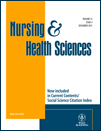Development of the Brief Bedside Dysphagia Screening Test in the Czech Republic
Address of the institution at which the work was carried out: Pardubice Regional Hospital, Kyjevská 44, 532 03 Pardubice, Czech Republic
Abstract
In patients who are prone to impaired swallowing, dysphagia screening has been advocated. However, most dysphagia screening tests are lacking gold-standard validation and nurse screeners. The purpose of this study was to develop a nursing dysphagia screening test to determine the penetration or aspiration risk in patients with neurological and ear, nose, and throat conditions. Eighty-seven Czech patients underwent a bedside assessment by nurse screeners. A comparison of the results to the gold standard, flexible endoscopic examination of swallowing, identified eight “important” or “marginal” assessment items, which were combined into one test, called the Brief Bedside Dysphagia Screening Test: “ability to clench the teeth”; “symmetry/strength of the tongue”; “symmetry/strength of the facial muscles”; “symmetry/strength of the shoulder shrug”; “dysarthria”; “thick liquid: choking”; “thick liquid: dripping from the mouth”; and “thick liquid: cough”. The sensitivity, specificity, and negative predictive value of the Brief Bedside Dysphagia Screening Test were: 87.1%, 30.4%, and 81%, respectively, in all patients; 95.2%, 27.5%, and 93.3%, respectively, in patients with neurological conditions; and 60%, 60%, and 42.9%, respectively, in patients with ear, nose, and throat conditions. The test is more suitable for patients with neurological conditions than for more heterogeneous patient populations.




